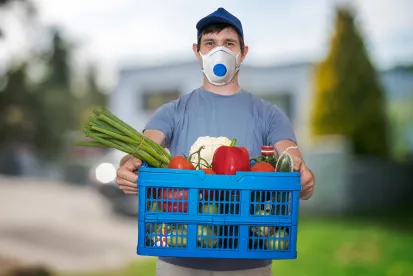On April 7, 2020, Mayor Eric Garcetti doubled down his efforts to curtail the spread of the novel coronavirus in the workplace by issuing the Worker Protection Order (the “Order”). The Order applies to all workers who work at businesses or perform services that are exempt under certain subsections of Paragraph 5(vii) of the City of Los Angeles Safer At Home Emergency Order (“Covered Businesses”). The Order comes on the heels of the pandemic’s single deadliest day in this country – nearly 2,000 recorded deaths.
As set forth in the Order, effective April 10, 2020, at 12:01 a.m.:
-
Covered Businesses must provide all workers with “face coverings” (defined below) while such workers perform their work;
-
All customers and visitors of Covered Businesses must also wear face coverings;
-
Owners and operators of Covered Businesses may refuse admission or service to anyone who fails to wear face coverings under the Order;
-
Covered Businesses must allow workers to wash their hands at least every 30 minutes;
-
Covered Businesses must ensure workers have access to clean restrooms and other cleansing and sanitization products; and
-
Covered Businesses must implement social distancing measures that provide a six-foot buffer between individuals to the extent possible.
Failure to comply with these orders may result in fines and imprisonment. We explore the orders and relevant terminology below.
A Closer Look at the Worker Protection Order
Three weeks ago, we unpacked Mayor Garcetti’s March 19, 2020 Safer at Home Emergency Order (“March 19 Order”). Among other things, the March 19 Order exempts various essential business operations from its scope. You can find a list of those essential business operations, and our analysis of the March 19 Order, here.
The new Order imposes additional requirements on a subset of the essential business operations (i.e., Covered Businesses) that are exempted by the March 19 Order. These Covered Businesses include:
-
Grocery stores, water retailers, farm and produce stands, supermarkets, convenience stores, warehouse stores, food banks, certified farmers markets and other establishments engaged in the retail sale of canned food, dry goods, fresh fruits and vegetables, pet food and medication supply (but not grooming or training), fresh or frozen meats, fish, and poultry, any other household consumer products (such as construction supplies, cleaning and personal care products);
-
Organizations and businesses that provide food, social services and other necessities of life for economically disadvantaged or otherwise needy individuals (including gang prevention and intervention, domestic violence, and homeless services agencies);
-
Hardware and building supply stores, day labor centers, and nurseries;
-
Plumbers, electricians, exterminators, custodial/janitorial workers, handyman services, funeral home workers and morticians, moving services, HVAC installers, carpenters, day laborers, landscapers, gardeners, property managers and leasing agents, private security personnel;
-
Laundromats, dry cleaners, and laundry service providers;
-
Restaurants and retail food facilities that prepare and offer food to customers, but only via delivery service, to be picked up, or drive-thru;
-
Individuals and businesses that ship or deliver groceries, food, beverages or goods directly to residences or businesses;
-
Taxis, ride sharing services, car rental companies, and other private transportation services; and
-
Hotels, motels and shared rental units.
Pursuant to the Order, Covered Businesses are subject to six new requirements.
First, Covered Businesses must provide “face coverings” to workers at the business’ own expense. Face coverings may be fabric coverings (such as scarves or bandanas) and do not have to be medical-grade masks or N95 respirators. Workers wearing reusable face coverings must wash them at least once a day. All single-use face coverings must be disposed of properly.
Second, customers and visitors of Covered Businesses must also wear face coverings. Like those worn by workers, face coverings may be fabric coverings (such as scarves or bandanas) and do not have to be medical-grade masks or N95 respirators.
Third, Covered Businesses may refuse admission or service to “any individual” who fails to wear a face covering as required by the Order. Although the Order does not define “any individual,” this likely includes workers, given that Mayor Garcetti is “requiring [workers] to wear non-medical grade face coverings while performing their work.”
Fourth, Covered Businesses must allow workers to wash their hands every 30 minutes.
Fifth, Covered Businesses must ensure that employees have access to clean, sanitary restrooms stocked with “all necessary cleansing products” or “sanitizing agents” that are required under the L.A. County Department of Public Health protocols. You can find those protocols here. While the Order does not define “cleansing products” or “sanitizing agents,” these, too, must be provided by employers.
Finally, Covered Businesses must enforce social distancing measures not only for workers, but also for customers and visitors. Covered Businesses must create a six-foot buffer between all workers, customers, and visitors, to the extent possible.
It is worth noting that, although not required, the Order “encourage[s] all retail businesses . . . to install plexiglass to separate cashiers and customers at all points of sale.”
The Order becomes effective this Friday at 12:01 a.m., so Covered Businesses must prepare to comply with this Order immediately. Failure to follow the Order constitutes a misdemeanor, subject to fines and imprisonment. The Mayor is “urg[ing]” the Los Angeles Police Department and the City Attorney to enforce the Order.
Note that Mayor Garcetti may extend the Order before May 1, 2020.
You can read a full copy of the April 7 Order here.




 />i
/>i

